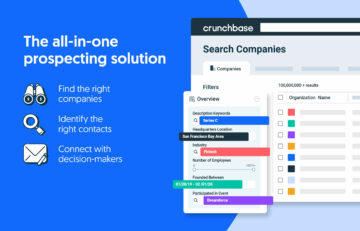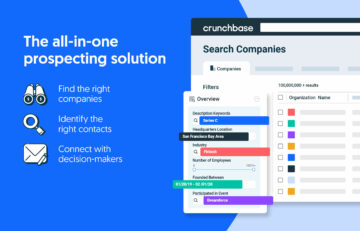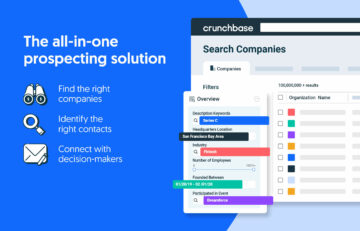Just as the way people work has continued to evolve, the way investors look at tech to manage that workforce has changed in the past year.
Venture funding to the plethora of startups providing tools and platforms in the human resources space exploded in 2021 — as it did in most sectors — with innovative startups locking up more than $10.5 billion in over 800 deals globally, per Crunchbase data.
Search less. Close more.
Grow your revenue with all-in-one prospecting solutions powered by the leader in private-company data.
Last year, such startups had similar luck, raising more than $8 billion in nearly 700 deals even as the venture market cooled.
However, venture funding in HR has been called into the office (so to speak) through the last four quarters, taking in less than $3.3 billion as deal flow also slowed.
In fact, the recent second quarter was the slowest in the sector for venture dollars in three years and put HR tech startups on pace to raise about $3.3 billion for the current year.
No big money
In addition, large growth rounds in the space have virtually disappeared, with only two rounds of more than $100 million raised.
Even the numbers this year are slightly inflated, thanks to San Francisco-based HR management company Rippling’s massive round back in March as the Parker Conrad-founded company was caught up in the collapse of SVB, its primary banking partner. The company quickly raised a $500 million Series E funding — that valued the company at $11.25 billion — from existing investor Neil Mehta at Greenoaks.
Other big rounds this year include Belgium-based Odoo, which offers an integrated suite of business apps built through an open-source development model, raising approximately $164 million in a round from General Atlantic in June. Columbus, Ohio-based MentorcliQ, an employee mentoring software platform that helps upskill and retain employees, raised an $80 million venture round led by PSG in March.
“It really doesn’t surprise me,” said Anna Barber, a partner at venture firm M13 who invests in “future of work” startups. “Rounds are smaller and it’s taking longer to raise money in all the industries. However, I do think there is something specific to HR tech right now.”
Innovation and AI
Barber said some of those specific issues related to HR tech include the massive amount of innovation the sector undertook as remote-work tools took center stage after the pandemic struck.
“I think there was such innovation then, there is less investment now,” she said.
That is borne out in the Crunchbase data, as venture funding in 2021 more than tripled when compared to 2020.
Another reason for the funding dip also could be due to the main headline-grabber of the moment in tech — artificial intelligence.
Much of AI involving business and work tools has shied away from HR and more toward productivity tools that help with writing and creating, Barber said.
With investors being more shrewd with their dollars and limiting their B2B dealmaking these days, they are likely to focus more on the tech juiced up with AI technology.
AI’s role in HR
That is not to say there are not AI applications in the human resource sector. AI could help with recruiting pipelines or using large language models to interpret new policies and laws in the field, as well as craft responses.
Barber also points to a portfolio company, Santa Monica, California-based AllVoices, which uses AI in HR departments with case management to effectively resolve workplace issues.
Another example is one of the largest rounds in the space this year. Redwood City, California-based Simpplr raised a $70 million round in May. The startup uses an AI-enhanced platform that tries to provide personalized experiences to engage employees.
While AI may seemingly not have had a huge impact on the HR space yet, its time may still be coming.
What’s next?
Aside from all things AI, there have been other bright spots in adjacent areas such as employee benefits, Barber said. Childcare platforms — M13 has invested in Los Angeles-based WeeCare — have seen some interest, especially as more companies underwrite them and government funding becomes available.
Nevertheless, funding and other dealmaking like M&A remains slow.
“I think right now there is a disconnect on price with buying and selling,” Barber said. “Multiples eventually will come down. … And I think you will see the secondary market pick up. That sets the price.”
Related Crunchbase Pro query
Illustration: Li-Anne Dias


Stay up to date with recent funding rounds, acquisitions, and more with the Crunchbase Daily.
Venture firms with solid, successful platform teams would do well to keep them intact no matter the direction the market is moving, writes Scale…
So far this year, not a single education technology company has raised a venture round of $100 million or more, per Crunchbase data, but there are…
SoftBank’s Vision Fund unit — known for its investment in startups including Uber, WeWork and DoorDash — posted its first gain in six quarters as the…
Daybreak Health, a San Francisco-based provider of online mental health counseling for teens, has announced its Series B.
- SEO Powered Content & PR Distribution. Get Amplified Today.
- PlatoData.Network Vertical Generative Ai. Empower Yourself. Access Here.
- PlatoAiStream. Web3 Intelligence. Knowledge Amplified. Access Here.
- PlatoESG. Automotive / EVs, Carbon, CleanTech, Energy, Environment, Solar, Waste Management. Access Here.
- PlatoHealth. Biotech and Clinical Trials Intelligence. Access Here.
- ChartPrime. Elevate your Trading Game with ChartPrime. Access Here.
- BlockOffsets. Modernizing Environmental Offset Ownership. Access Here.
- Source: https://news.crunchbase.com/workplace/hr-tech-vc-funding-startups-data/
- :has
- :is
- :not
- $100 million
- $3
- $UP
- 2020
- 2021
- 25
- 700
- a
- About
- acquisitions
- addition
- adjacent
- After
- AI
- All
- all-in-one
- also
- amount
- an
- and
- announced
- applications
- approximately
- apps
- ARE
- areas
- artificial
- artificial intelligence
- AS
- At
- available
- away
- b
- B2B
- back
- Banking
- BE
- becomes
- been
- being
- benefits
- Big
- Billion
- Bright
- built
- business
- but
- Buying
- by
- called
- case
- caught
- Center
- center stage
- changed
- City
- Close
- Collapse
- come
- coming
- Companies
- company
- compared
- continued
- could
- craft
- Creating
- CrunchBase
- Current
- daily
- data
- Date
- Days
- deal
- Deals
- departments
- Development
- DID
- Dip
- direction
- do
- Doesn’t
- dollars
- DoorDash
- down
- due
- Education
- effectively
- Employee
- employees
- end
- engage
- especially
- Even
- eventually
- evolve
- example
- existing
- Experiences
- fact
- Falls
- far
- field
- Firm
- firms
- First
- flow
- Focus
- For
- four
- from
- fund
- funding
- funding rounds
- Gain
- Globally
- Government
- Growth
- had
- Have
- Health
- help
- helps
- However
- hr
- HR Tech
- http
- HTTPS
- huge
- human
- HUMAN RESOURCE
- Human Resources
- i
- Impact
- in
- include
- Including
- industries
- Innovation
- innovative
- integrated
- Intelligence
- interest
- into
- invested
- investment
- investor
- Investors
- Invests
- involving
- issues
- IT
- ITS
- jpg
- june
- Keep
- known
- language
- large
- largest
- Last
- Laws
- leader
- Led
- less
- like
- likely
- limiting
- longer
- Look
- los
- Low
- luck
- M&A
- Main
- manage
- management
- March
- Market
- massive
- Matter
- May..
- me
- mental
- Mental health
- mentoring
- million
- model
- models
- moment
- money
- more
- most
- moving
- nearly
- New
- next
- no
- now
- numbers
- of
- Offers
- Office
- on
- ONE
- online
- only
- open source
- or
- Other
- out
- over
- Pace
- pandemic
- partner
- past
- People
- per
- Personalized
- pick
- platform
- Platforms
- plato
- Plato Data Intelligence
- PlatoData
- plethora
- points
- policies
- portfolio
- posted
- powered
- price
- primary
- Pro
- productivity
- Productivity Tools
- provide
- provider
- providing
- put
- Quarter
- quickly
- raise
- raised
- raising
- really
- reason
- recent
- Recent Funding
- recruiting
- related
- remains
- resource
- Resources
- responses
- retain
- revenue
- right
- rippling
- Role
- round
- rounds
- Said
- San
- Santa
- say
- Scale
- Second
- second quarter
- secondary
- Secondary Market
- sector
- Sectors
- see
- seemingly
- seen
- Selling
- Series
- Series B
- Sets
- she
- shrewd
- similar
- single
- SIX
- slow
- smaller
- So
- Software
- software platform
- solid
- Solutions
- some
- something
- Space
- speak
- specific
- spots
- Stage
- startup
- Startups
- stay
- Still
- successful
- such
- suite
- surprise
- taking
- teams
- tech
- tech startups
- Technology
- Teens
- than
- thanks
- that
- The
- their
- Them
- then
- There.
- These
- they
- things
- Think
- this
- this year
- those
- three
- Through
- time
- to
- took
- tools
- toward
- two
- Uber
- unit
- uses
- using
- valued
- VC
- venture
- venture-funding
- virtually
- vision
- VISION FUND
- was
- Way..
- WELL
- wework
- when
- which
- WHO
- will
- with
- Work
- Workforce
- Workplace
- would
- writing
- year
- years
- yet
- you
- Your
- zephyrnet












